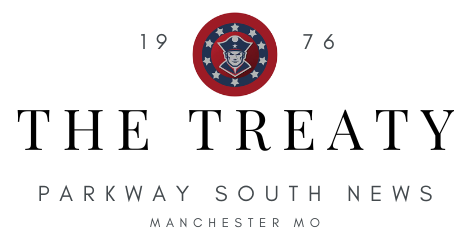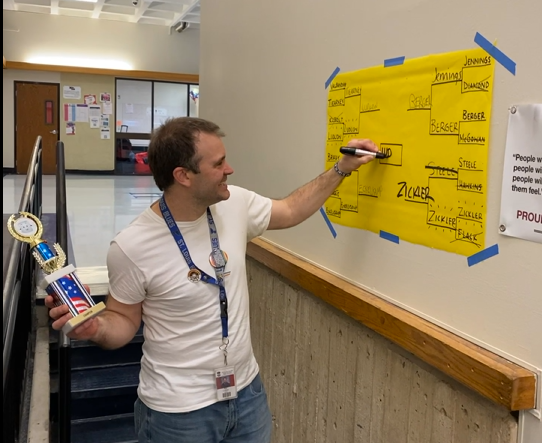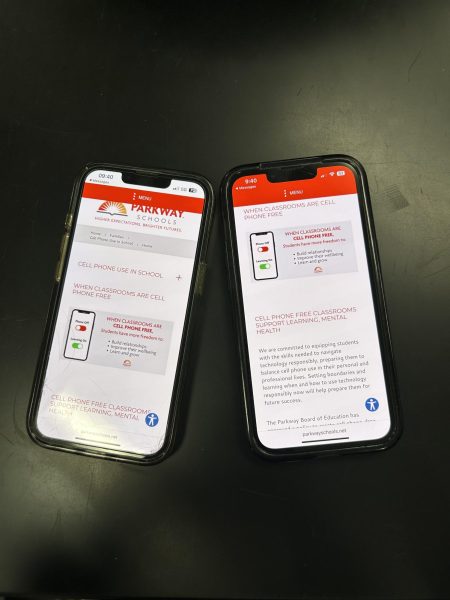Susan Scott
Every student deserves at least one teacher that prepares you to succeed in college, the ability to design lessons plans that help students prepare for the real world.
South High’s very own Chemistry teacher, Susan Scott, recently was awarded with the National Board Teaching Certification.
“I have to be honest, I was so nervous as I opened the email on Saturday morning (11-15-14) and as soon as I read the sentence, “I am pleased to inform you that you are a National Board Certified Teacher!” I basically collapsed and started to cry. said Scott. “ It was a rush of happiness and pure relief. I worked so hard last year to complete the work as best as I could. The specific certification is for Adolescents & Young Adult Science Certification (specifically Chemistry).”
National Board Certification is the most respected professional certification available in education and provides numerous benefits to teachers, students and schools. It was designed to develop, retain and recognize accomplished teachers and to generate ongoing improvement in schools nationwide.
Certification consists of four components: written assessment of content knowledge, reflection on student work samples, video and analysis of teaching practice, and documented impact and accomplishments as a teaching professional.
Throughout its more than 25-year history, the National Board has sought to review and revise its standards and certification process to reflect best practices in teaching.
Research shows that students of NBCTs outperform their peers in other classrooms.
According to www.nbpts.org National Board Standards and National Board Certification give teachers and schools the tools to define and measure teaching excellence. Similar to certification in fields like medicine, National Board Certification is a rigorous, peer-reviewed process that ensures that Board-certified teachers have proven skills to advance student achievement.
More than 100,000 National Board Certified Teachers (NBCTs) nationwide advance student learning through excellence and leadership. Although they represent only a small fraction of the nation’s teachers, NBCTs are the single largest group of accomplished practitioners, and they have had an outsized impact on improving public education.
“Mrs. Scott is one of those teachers who won’t let you give up on anything.” Kara Alexander says, one of Mrs. Scotts students. “She’s very dedicated to every student and is always pushing me to do my best.”
NBCTs are working in the areas where they are needed most. Nationwide, nearly half of all NBCTs work in high-need schools. Since 2005, more than a third of all winners of the Presidential Award for Excellence in Mathematics and Science Teaching have been NBCTs.
“During spring break of 2014 I read an Earth Science textbook and reviewed connections between all of the sciences.” Scott said
In 2008, a comprehensive meta-analysis of 11 studies conducted by the National Research Council concluded “the evidence is clear that National Board certification distinguishes more effective teachers from less effective teachers with respect to student achievement”.
Most recently, a 2012 study by Harvard University’s Strategic Data Project found that students of NBCTs in the Los Angeles Unified School District made learning gains equivalent to an additional two months of instruction in math and one month in English Language Arts.
“Mrs. Scott’s intelligence level is extremely high” says Mrs. Scott’s AP Chemistry student, Scarlett Bickerton. “She’s taught me how to use my resources (like my textbook) to answer my own questions.”
National Board Certification is an advanced teaching credential. As part of this process, teachers must analyze their teaching context and students’ needs, submit videos of their teaching, and provide student work samples that demonstrate growth and achievement. The reflective analyses that they submit must demonstrate: 1) A strong command of content; 2) The ability to design appropriate learning experiences that advance student learning; 3) The use of assessments to inform instructional decision making; and 4) Partnerships with colleagues, parents and the community.
Through this structured and iterative process, teachers expand and refine their content knowledge and pedagogy. The outcome is more powerful teaching that improves student achievement and reflects college and career readiness.
The National Board is dedicated to ensuring that more students across the country can learn from teachers who have proven themselves to be accomplished educators.
“Mrs. Scott has helped me become a better student by giving me the tools I need to become successful in and out of her class and is always pushing me to my highest academic potential.” Alexander said
“Every teacher should consider the process as a manner of examining their practice and growing professionally. It is probably one of the most extensive and comprehensive opportunities available to teachers for examining all of the significant aspects of teaching and demonstrate content knowledge (for me this was for science with an emphasis in chemistry).” Scott concluded






